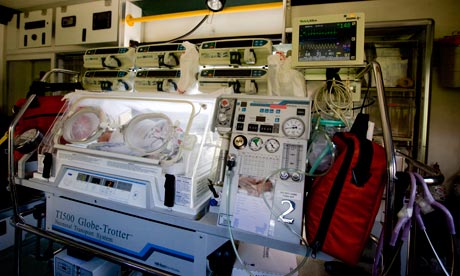
Newborn babies could die or suffer brain damage because hospitals are facing shortages of vital drugs, a senior doctor says.
Hospitals are having difficulties obtaining drugs that boost lung growth in unborn babies who doctors know will be born prematurely.
At least 20,000 babies a year in the UK who are born before they have reached 34 weeks' gestation routinely receive the drugs, called corticosteroids. They can prevent babies from dying or suffering brain damage through a lack of oxygen.
The shortages are revealed by Dr Susan Bewley, a consultant obstetrician at St Thomas' hospital in London, who specialises in foetal medicine. Writing in the magazine HealthWatch, she discloses that in the past two years the NHS has had trouble getting regular supplies of two main drugs used to promote lung development in unborn children.
"These two corticosteroids, dexamethasone and betamethasone, improve foetal lung maturity when babies are at high chance of premature delivery," writes Bewley. "Corticosteroids do save life and prevent handicapping brain haemorrhage in premature infants."
They are given to the baby's mother in two injections 12-24 hours apart to prevent the infant from suffering a condition called respiratory distress syndrome.
The highly respected Cochrane Library, global experts in establishing which medical treatments are effective, concluded that "this treatment results in fewer babies dying and fewer common serious neurological and abdominal problems … that affect babies born very early".
According to Professor Sabaratnam Arulkumaran, the recent past president of the Royal College of Obstetricians and Gynaecologists, the drugs are cheap and highly effective. They are given to unborn babies under 34 weeks whose mothers have already started having early contractions.
He has raised concerns with the Department of Health (DH) about the supply problems, which are thought to result from manufacturing issues and the fall of sterling against the euro.
Bewley relates experiencing several shortages of the drugs in the past two years. No infant was harmed as she was able to use other drugs. But, she warns, problems look likely to continue. "The risk is that patients will not receive effective, timely medication and be endangered as a consequence."
The shortages may mean rationing, with doctors and midwives forced to decide which patients need the drugs most, Bewley believes. Hospitals should agree to lend each other spare supplies, she says.
Andy Cole, the chief executive of Bliss, the sick baby charity, said access to the drugs was vital. "These lifesaving drugs have been crucial in helping to drive up survival rates for many premature babies since the late 1980s," he said. "They are an established and essential part of care for a preterm pregnancy. Availability should be made to any expectant mother, whenever and wherever they are needed, to ensure the very best outcome for her vulnerable baby."
The health department acknowledged that hospitals had experienced difficulties getting the drugs, but said things were back to normal. "In the cases of dexamethasone and betamethasone injections, the recent supply problems have occurred due to manufacturing problems," said a spokeswoman.
"The DH has worked with both the MHRA [Medicines and Healthcare products Regulatory Agency] and the manufacturers to help resolve the manufacturing issues and minimise disruption to patients. Both betamethasone and dexamethasone injection are now available as normal. The department continues to monitor the situation and is in close contact with the companies involved."
A spokeswoman for the Royal Pharmaceutical Society, which represents pharmacists, said betamethasone had been "in short supply for some time" and "the shortage is a manufacturing issue". Hospitals unable to get betamethasone had been ordering extra supplies of dexamethasone, which performs the same function, causing some shortages of that drug too, she said.

